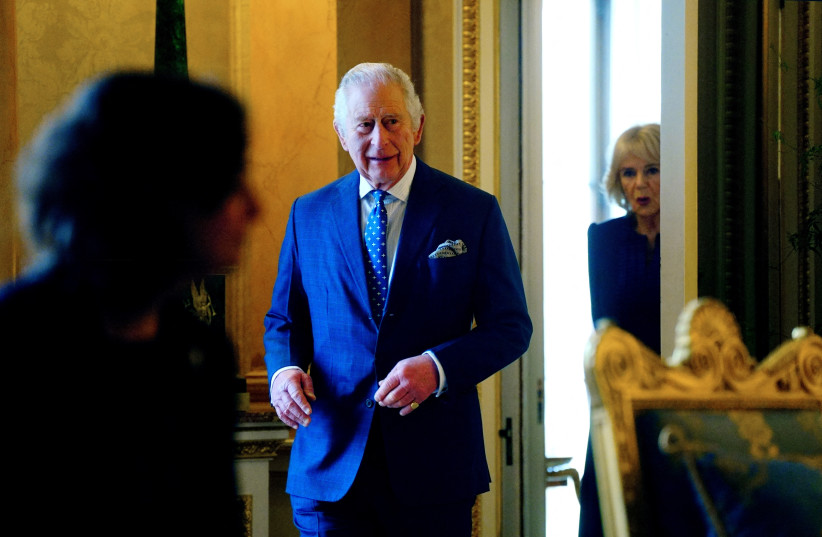The coronation of King Charles III on Saturday heralds a new era, not just for Britain and the Commonwealth, but also – hopefully – for British-Israeli ties. Nothing would crown this moment better than an official visit by the king to the Holy Land.
Charles has, in fact, come to Israel three times – once to attend the 2020 World Holocaust Forum at Yad Vashem, marking 75 years since the liberation of Auschwitz-Birkenau, and previously for the funerals of Yitzhak Rabin and Shimon Peres, in 1995 and 2016, respectively. During his last trip, he made a point of visiting the Church of Mary Magdalene on the Mount of Olives, the burial place of his grandmother, Princess Alice of Greece, who sheltered Jews during the Holocaust.
It is significant that at the coronation itself, the king was anointed with oil produced from olive trees near the Church of Mary Magdalene.
Despite several invitations, the king’s mother, Queen Elizabeth II, chose not to visit Israel during her seven-decade reign. “It was commonly believed that the British Foreign Office, for fear of Arab boycotts, had advised the queen not to visit Israel, but even after there was no longer any real fear of boycotts and oil embargoes, the queen still did not come,” according to Jerusalem Post correspondent Greer Fay Cashman, who pointed out that the queen did visit Jordan, Egypt and other countries in the region.
Israel and King Charles
Following Charles’s coronation, Prime Minister Benjamin Netanyahu issued a statement on Twitter, saying, “Along with the entire people of Israel, my wife Sara and I send our wholehearted congratulations to King Charles III and Queen Camilla on their historic coronation. May it mark the further strengthening of the deep bond between our two nations.”

President Isaac Herzog and his wife, Michal, represented Israel at the coronation. It was Herzog’s third meeting with Charles since becoming president in 2021. The first was in London shortly after he took office and the second was at the funeral of Queen Elizabeth II last year.
During the royal reception at Buckingham Palace, Charles chatted with the Herzogs about the situation in Israel, reportedly commending the president for his mediation efforts in the government’s judicial overhaul plan.
Britain’s Chief Rabbi Ephraim Mirvis, who was knighted by Charles last year, and his wife, Valerie, were invited to spend Friday night at Clarence House to allow them to walk to Westminster Abbey for the coronation and avoid desecrating Shabbat. A kosher caterer provided meals for both the Herzogs and the Mirvises, and the chief rabbi’s office praised the “respectful, sensitive” way that the Royal Palace had dealt with the situation.
There have been royals who visited Israel in the past, officially and unofficially. In 2007, Prince Edward, the king’s youngest brother, who is now the Duke of Edinburgh, visited Israel at the invitation of the Israel Youth Award program, an offshoot of a program initiated 50 years earlier by his father, Prince Philip.
In 1994, Prince Philip himself traveled to Israel to visit the tomb of his mother, Princess Alice.
In 2018, Prince William, the king’s older son, who is now first in line to the throne, made an official visit to Israel. “Never has hope and reconciliation been more needed,” William told a reception at the residence of UK ambassador David Quarrey, referring to the Arab-Israeli conflict. “I know I share a desire with all of you, and with your neighbors, for a just and lasting peace.”
The Guardian reported at the time: “The Foreign Office view for decades had been that such a visit was contingent on progress in the peace process, which means William’s visit was being seen by Israelis – not least the prime minister, Benjamin Netanyahu – as a significant moment.”
If he hasn’t done so already, now is as good a time as ever for President Herzog to issue an official invitation for King Charles III and Queen Camilla to visit Israel – and for the king and queen to accept it. In addition to becoming the first British monarch to pay an official visit to the Holy Land, which would be truly historic, the king – an avid environmentalist – might see for himself how the British oak tree that he planted with former president Reuven Rivlin in 2020 has grown in Jerusalem.
